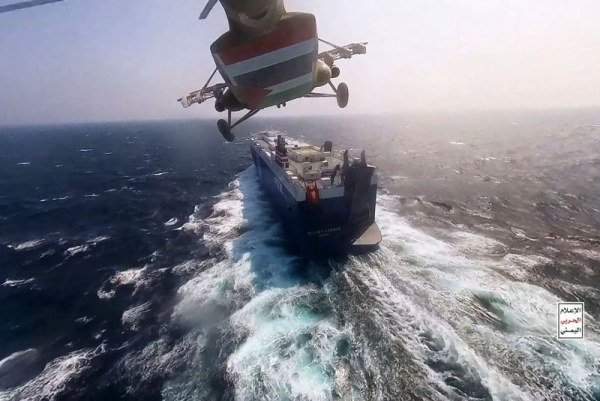
1 of 2 | Thursday’s strike against Houthi targets in Yemen marks the first direct action the United States has taken since the group began attacking commercial vessels in November. Photo by Houthi Group press Service | License Photo
In a major shift, the United States and its allies have begun full, large-scale retaliation against recent Houthi attacks in the Red Sea.
Officials at U.S. Central Command said Thursday the U.S. Navy and its allies have struck back against Houthi targets in Yemen in retaliation for attacks on commercial vessels in the region. Advertisement
According to CENTCOM, three U.S. destroyers, along with U.S. F-18s and a British warship, on Thursday shot down 18 drones and multiple missiles launched from Houthi-controlled bases in Yemen in retaliation for one of the rebel group’s largest attacks on Tuesday.
The targets included radar systems, drone storage and launch sites, ballistic missile storage and launch sites, and cruise missile storage and launch sites, CNN reported.
There were no ships damaged in the attack and no injuries reported.
President Joe Biden in a statement said the strike was a “defensive action after repeated warnings to the rebel group. Advertisement
“These strikes are in direct response to unprecedented Houthi attacks against international maritime vessels in the Red Sea — including the use of anti-ship ballistic missiles for the first time in history,” Biden said. “These attacks have endangered U.S. personnel, civilian mariners, and our partners, jeopardized trade, and threatened freedom of navigation.”
The
In the tension leading up to Thursday’s strike, U.S. Secretary of State Antony Blinken on Wednesday had said “there will be consequences” following the most-recent Houthi attack. Blinken is scheduled to wrap up his fourth tour of the Middle East amid Israel’s war with Hamas and fears of growing hostilities in the region.
Moments before Thursday’s attack, Houthi rebel leader Abdul-Malik al-Houthi told the United States and its allies that the Houthis would fight back if struck, and the response, he said, will be greater than the attack the group orchestrated Tuesday.
“We are more determined to target ships linked to Israel, and we will not back down from that,” al-Houthi said, adding the group’s only targets are ships linked to Israel, and any other commercial vessels can pass through the Red Sea unbothered.
U.S. national security adviser John Kirby was spare on details in the hours leading up to the attack. In a White House press conference Thursday afternoon, Kirby refused to speculate about potential military operations, but he did say the Houthis need to stop their attacks or face consequences. Advertisement
“I’m not going to telegraph punches one way or another here,” Kirby told reporters. “We’re going to do what we have to do to counter and defeat these threats that the Houthis keep throwing up on commercial shipping in the Red Sea.”
Houthis have launched at least 27 attacks on commercial shipping vessels in the Red Sea since Nov. 19, CENTCOM said. Thursday’s strike was the first the United States and its allies carried out since the Houthis began their attacks in November.
Although the United States has carried out proxy strikes against Iranian targets to avoid escalation in the region, Thursday marked the first direct strike against the Houthis in Yemen.
The Biden administration had long been hesitant about striking the Houthis, fearing such action could break an already delicate cease-fire between the rebel group and Saudi Arabia.
But the Houthi’s continued attacks have had a severe impact on trade. According to one U.N. official, at least 18 shipping companies have rerouted their vessels around South Africa, adding 10 days to their trips, just to avoid the Red Sea. T
he Pentagon also said 55 nations have direct connections to the ships that have been attacked.